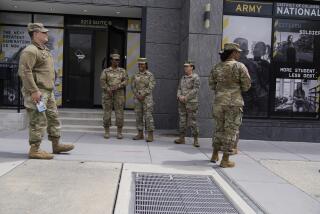Troops Could Leave Afghanistan in 2004
- Share via
BAGRAM, Afghanistan — The departing commander of U.S.-led military forces in Afghanistan says those troops’ success fighting terrorist holdouts, combined with improved recruiting by the new Afghan army, means that Americans stationed here could start going home as early as summer 2004.
During an interview in which he reviewed his year in command, Army Lt. Gen. Dan K. McNeill gave no timeline for a U.S. withdrawal. And Afghan ground troops may need U.S. air support indefinitely, since there is no plan at present for the American military to train Afghan helicopter or jet aircraft pilots, he said.
But he credited a shift in allied military tactics last summer to battalion-size conventional operations for cleaning out large numbers of terrorist holdouts, uncovering several huge caches of weapons and crippling enemy forces’ ability to mount a meaningful offensive.
“From a military point of view, we have done a superb job,” McNeill said. “There’s still some enemy out there, just a whole less of them. A lot of people expected the enemy to mount a spring offensive this year, and the fact is that the [military force] mounting it was us.”
The general said Friday that 9,000 Afghan soldiers should be trained and on duty by the summer of next year, which would permit a gradual reduction of allied forces. The latter currently number 11,500, of whom 8,500 are U.S. soldiers, Marines and airmen.
Defense Secretary Donald H. Rumsfeld told reporters during a visit to the Afghan capital, Kabul, on Thursday that the combat phase of military operations in Afghanistan was largely over and that forces had begun “shifting their weight” to concentrate more on civil assistance and reconstruction projects.
But remnants of the deposed Taliban regime and Al Qaeda terrorist network continue to harass U.S. bases and patrols -- especially near the Pakistani border, where many have taken refuge -- killing and wounding U.S. and Afghan troops.
As he has in other interviews, McNeill criticized Pakistan for not doing more to police its border and control the movements of terrorist forces known to seek shelter there. But he also praised the country for arresting about 470 Al Qaeda and Taliban suspects and giving the U.S. military transit, flyover and basing rights.
The allies have launched a dozen large-scale conventional operations, with forces numbering up to 500, since August. Previously, it concentrated on sending out small units, such as Special Forces platoons, to seek out and confront the enemy, he said.
McNeill said he made the change because he and his staff calculated that one of the mistakes committed by Soviet forces during their disastrous 10-year occupation of Afghanistan, which ended in 1989, was that they “hunkered down in bases next to airfields too much and did not stay on the move.”
The change in tactics “produced fruit immediately” in limiting the enemy’s ability to find sanctuary, the general said. U.S. forces also benefited from developing better local intelligence.
McNeill, 56, has been in charge of allied forces, whose headquarters are in Bagram, since May 2002. He expects to be ordered to resume his previous command of the 18th Airborne Corps at Ft. Bragg, N.C., in coming weeks. The North Carolina native is also a former commander of the 82nd Airborne Division.
He described Afghanistan as a harsh environment for any commander. Allied forces have had to deal with climatic extremes; blinding dust storms; a variety of pests, including cobras and scorpions; and the threat of diseases such as hepatitis, typhus and dysentery. Disease and noncombat injuries took a heavy toll on Soviet forces during their occupation.
“Extraordinary measures” to maintain hygiene have kept the incidence of disease among troops very low, McNeill said.
The general said he is optimistic that a United Nations-backed and Japanese-financed plan to disarm thousands of Afghan militiamen will be successful -- as long as an ongoing effort to reform and reconstitute the leadership of the Afghan Ministry of Defense is successful.
The ministry is now dominated by Tajik commanders from the Northern Alliance coalition of militias, which combined with the U.S. military to drive the Taliban from power. But other ethnic groups, including the Pushtuns, must have greater representation before they give up their arms, he said.
For disarmament to be successful, the country must also see a “bolder step” in the pace of large-scale reconstruction projects and the jobs they create, so that demobilized militiamen have alternatives to being on the payrolls of warlords, McNeill said.
More to Read
Sign up for Essential California
The most important California stories and recommendations in your inbox every morning.
You may occasionally receive promotional content from the Los Angeles Times.













